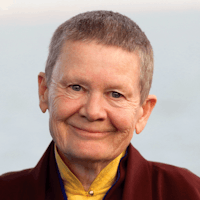At the bottom, we discover water, the healing water of bodhichitta. Right down there in the thick of things, we discover the love that will not die.
Pema Chödrön

The Love That Will Not Die
Topic: Love, Compassion, & Kindness
At our pace, without speed or aggression, we move down and down and down. With us move millions of others, our companions in awakening from fear. At the bottom, we discover water, the healing water of bodhichitta. Right down there in the thick of things, we discover the love that will not die.
Pema Chödrön, born Deirdre Blomfield-Brown on July 14, 1936, in New York City, grew up on a farm in New Jersey. She attended Miss Porter's School before earning a degree in English literature from Sarah Lawrence College and a master’s in elementary education from the University of California, Berkeley. She married at 21 and had two children before experiencing two divorces. Her spiritual journey led her to study Buddhism with Lama Chime Rinpoche in London and Chögyam Trungpa Rinpoche in the United States. In 1974, she was ordained as a novice nun by the Sixteenth Gyalwa Karmapa, Rangjung Rigpe Dorje, and in 1981, became the first American woman fully ordained in the Vajrayana tradition.
Chödrön played a key role in bringing Tibetan Buddhism to the West. In the early 1980s, Trungpa Rinpoche appointed her director of the Boulder Shambhala Center in Colorado. She later moved to Gampo Abbey in Nova Scotia, the first Tibetan Buddhist monastery in North America for Western students, becoming its director in 1986. Recognized as an acharya (senior teacher) in 1993, she continued teaching despite health challenges, including chronic fatigue syndrome. Her books, such as When Things Fall Apart (1996) and No Time to Lose (2005), explore resilience, mindfulness, and compassion, emphasizing shenpa, the habitual grasping that leads to suffering.
In 2020, Chödrön retired from her role as acharya within Shambhala International, citing concerns over the organization’s direction. She continues to teach, lead retreats, and study with her teacher, Dzigar Kongtrul Rinpoche. Recognized for her contributions to Buddhist practice, she received the Global Bhikkhuni Award in 2016. Though she stepped back from institutional leadership, she remains a guiding voice in contemporary Buddhism, emphasizing the power of mindfulness and compassion in daily life.
When Things Fall Apart
Chodron, Pema. When Things Fall Apart. Shambhala, 1997 [Pema Chödrön, When Things Fall Apart: Heart Advice for Difficult Times] pp. 91-92.

Pema Chödrön
Theme: Love

About This Pema Chödrön Quotation [Commentary]
On Being with Krista Tippett: Devendra Banhart ‘When Things Fall Apart’ [Excerpt]
Tippett: So maybe I’ll read a few of these parts from “When Things Fall Apart,” just because I just want to read them and see if they—they struck me, when I was getting ready. “Things falling apart is a kind of testing and also a kind of healing. We think that the point is to pass the test or to overcome the problem, but the truth is that things don’t really get solved. They come together and they fall apart. Then they come together again and fall apart again. It’s just like that. The healing comes from letting there be room for all of this to happen: room for grief, for relief, for misery, for joy.”
A little bit later on, she says, “The only time we ever know what’s really going on … the only time we ever know what’s really going on—is when the rug’s been pulled out and we can’t find anywhere to land. We use these situations either to wake ourselves up or to put ourselves to sleep. Right now — in the very instant of groundlessness—is the seed of taking care of those who need our care and of discovering our goodness.”
Banhart: Amen. [laughs] That passage is perfect. Perfect.
And there’s also something really, really hopeful, in that when you initially read, “Things come together, and they fall apart,” there’s that sorrow—“No, I don’t want it to fall apart. I want to hold onto that good thing.” But then look at it inversely, and it’s like, this time will pass. This is gonna fall apart, too; this thing we’re going through, this pandemic, it will fall apart.
Tippett: [laughs] The falling apart will fall apart, too.
Banhart: So that’s nice. We can embrace, we can celebrate that, because it’s a fact. Things fall apart. [laughs]
Tippett: This is, in my version, these are the last two paragraphs of the “The Love That Will Not Die” chapter.
Would you—I would just love to hear you read these two paragraphs.
Banhart: Of course. “Spiritual awakening is frequently described as a journey to the top of a mountain. We leave our attachments and our worldliness behind and slowly make our way to the top. At the peak we have transcended all pain. The only problem with this metaphor is that we leave all the others behind—our drunken brother, our schizophrenic sister, our tormented animals and friends. Their suffering continues, unrelieved by our personal escape.
“In the process of discovering bodhichitta, the journey goes down, not up. It’s as if the mountain pointed toward the center of the earth instead of reaching into the sky. Instead of transcending the suffering of all creatures, we move toward the turbulence and doubt. We jump into it. We slide into it. We tiptoe into it. We move toward it however we can. We explore the reality and unpredictability of insecurity and pain, and we try not to push it away. If it takes years, if it takes lifetimes, we let it be as it is. At our own pace, without speed or aggression, we move down and down and down. With us move millions of others, our companions in awakening from fear. At the bottom we discover water, the healing water of bodhichitta. Right down there in the thick of things, we discover the love that will not die.”
Tippett: Devendra Banhart is a singer-songwriter and visual artist. He’s released ten albums including Rejoicing in the Hands, and most recently, Ma.
Resources
Related Quotes
Copyright © 2017 – 2026 LuminaryQuotes.com About Us